As public opinion regarding the punishment of criminals has become increasingly retributive, America has evolved into a mass incarceration society. In 1970, 300,000 Americans were in prison; today that number is roughly two million. The shift from a rehabilitation consensus to one favoring retribution has had a disproportionate impact on African-American and Latino men, who are incarcerated at much higher rates than white males. This state of affairs raises a host of social science questions, as well as questions of social justice.

The Handbook of Research Synthesis and Meta-Analysis, Second Edition
About This Book
Praise for the first edition:
“The Handbook is a comprehensive treatment of literature synthesis and provides practical advice for anyone deep in the throes of, just teetering on the brink of, or attempting to decipher a meta-analysis. Given the expanding application and importance of literature synthesis, understanding both its strengths and weaknesses is essential for its practitioners and consumers. This volume is a good beginning for those who wish to gain that understanding.” —Chance
“Meta-analysis, as the statistical analysis of a large collection of results from individual studies is called, has now achieved a status of respectability in medicine. This respectability, when combined with the slight hint of mystique that sometimes surrounds meta-analysis, ensures that results of studies that use it are treated with the respect they deserve….The Handbook of Research Synthesis is one of the most important publications in this subject both as a definitive reference book and a practical manual.”—British Medical Journal
When the first edition of The Handbook of Research Synthesis was published in 1994, it quickly became the definitive reference for researchers conducting meta-analyses of existing research in both the social and biological sciences. In this fully revised second edition, editors Harris Cooper, Larry Hedges, and Jeff Valentine present updated versions of the Handbook’s classic chapters, as well as entirely new sections reporting on the most recent, cutting-edge developments in the field.
Research synthesis is the practice of systematically distilling and integrating data from a variety of sources in order to draw more reliable conclusions about a given question or topic. The Handbook of Research Synthesis and Meta-Analysis draws upon years of groundbreaking advances that have transformed research synthesis from a narrative craft into an important scientific process in its own right. Cooper, Hedges, and Valentine have assembled leading authorities in the field to guide the reader through every stage of the research synthesis process—problem formulation, literature search and evaluation, statistical integration, and report preparation. The Handbook of Research Synthesis and Meta-Analysis incorporates state-of-the-art techniques from all quantitative synthesis traditions. Distilling a vast technical literature and many informal sources, the Handbook provides a portfolio of the most effective solutions to the problems of quantitative data integration. Among the statistical issues addressed by the authors are the synthesis of non-independent data sets, fixed and random effects methods, the performance of sensitivity analyses and model assessments, and the problem of missing data.
The Handbook of Research Synthesis and Meta-Analysis also provides a rich treatment of the non-statistical aspects of research synthesis. Topics include searching the literature, and developing schemes for gathering information from study reports. Those engaged in research synthesis will also find useful advice on how tables, graphs, and narration can be used to provide the most meaningful communication of the results of research synthesis. In addition, the editors address the potentials and limitations of research synthesis, and its future directions.
The past decade has been a period of enormous growth in the field of research synthesis. The second edition Handbook thoroughly revises original chapters to assure that the volume remains the most authoritative source of information for researchers undertaking meta-analysis today. In response to the increasing use of research synthesis in the formation of public policy, the second edition includes a new chapter on both the strengths and limitations of research synthesis in policy debates and decisions. Another new chapter looks at computing effect sizes and standard errors from clustered data, such as schools or clinics. Authors also discuss updated techniques for locating hard-to-find “fugitive” literature, ways of systematically assessing the quality of a study, and progress in statistical methods for detecting and estimating the effects of publication bias.
The Handbook of Research Synthesis and Meta-Analysis is an illuminating compilation of practical instruction, theory, and problem solving. This unique volume offers the reader comprehensive instruction in the skills necessary to conduct powerful research syntheses meeting the highest standards of objectivity. The significant developments included in the second edition will ensure that the Handbook remains the premier text on research synthesis for years to come.
HARRIS COOPER is professor of psychology and neuroscience at Duke University.
LARRY V. HEDGES is Board of Trustees Professor of Statistics and Social Policy, and Faculty Fellow, Institute for Policy Research, Northwestern University.
JEFFREY C. VALENTINE is assistant professor, Department of Educational and Counseling Psychology, College of Education and Human Development, University of Louisville.
CONTRIBUTORS: Pam M. Baxter, Betsy Jane Becker, Jesse A. Berlin, Michael Borenstein, Geoffrey D. Borman, Brad J. Bushman, Mike Clarke, Thomas D. Cook, Harris Cooper, David S. Cordray, Alice H. Eagly, Joseph L. Fleiss, Leon J. Gleser, Joel B. Greenhouse, Jeffrey A. Grigg, C. Keith Haddock, Larry V. Hedges, Sally Hopewell, Satish Iyengar, Spyros Konstantopoulos, Huy Le, Mark W. Lipsey, Georg E. Matt, Paul Morphy, Ingram Olkin, Robert G. Orwin, Therese D. Pigott, Stephen W. Raudenbush, Jeffrey G. Reed, Hannah R. Rothstein, Frank L. Schmidt, William R. Shadish, Alex J. Sutton, Jeffrey C. Valentine, Jack L. Vevea, Morgan C. Wang, Howard D. White, David B. Wilson, and Wendy Wood.
RSF Journal
View Book Series
Sign Up For Our Mailing List
Apply For Funding
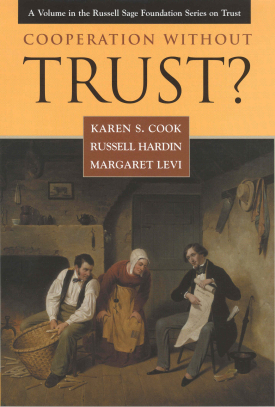
Cooperation Without Trust?
About This Book
Some social theorists claim that trust is necessary for the smooth functioning of a democratic society. Yet many recent surveys suggest that trust is on the wane in the United States. Does this foreshadow trouble for the nation? In Cooperation Without Trust? Karen Cook, Russell Hardin, and Margaret Levi argue that a society can function well in the absence of trust. Though trust is a useful element in many kinds of relationships, they contend that mutually beneficial cooperative relationships can take place without it.
Cooperation Without Trust? employs a wide range of examples illustrating how parties use mechanisms other than trust to secure cooperation. Concerns about one’s reputation, for example, could keep a person in a small community from breaching agreements. State enforcement of contracts ensures that business partners need not trust one another in order to trade. Similarly, monitoring worker behavior permits an employer to vest great responsibility in an employee without necessarily trusting that person. Cook, Hardin, and Levi discuss other mechanisms for facilitating cooperation absent trust, such as the self-regulation of professional societies, management compensation schemes, and social capital networks. In fact, the authors argue that a lack of trust—or even outright distrust—may in many circumstances be more beneficial in creating cooperation. Lack of trust motivates people to reduce risks and establish institutions that promote cooperation. A stout distrust of government prompted America’s founding fathers to establish a system in which leaders are highly accountable to their constituents, and in which checks and balances keep the behavior of government officials in line with the public will. Such institutional mechanisms are generally more dependable in securing cooperation than simple faith in the trustworthiness of others.
Cooperation Without Trust? suggests that trust may be a complement to governing institutions, not a substitute for them. Whether or not the decline in trust documented by social surveys actually indicates an erosion of trust in everyday situations, this book argues that society is not in peril. Even if we were a less trusting society, that would not mean we are a less functional one.
KAREN S. COOK is the Ray Lyman Wilbur Professor of Sociology and senior associate dean of social sciences at Stanford University.
RUSSELL HARDIN is professor of politics at New York University.
MARGARET LEVI is Jere L. Bacharach Professor of International Studies in the Department of Political Science, University of Washington, Seattle.
A Volume in the Russell Sage Foundation Series on Trust
RSF Journal
View Book Series
Sign Up For Our Mailing List
Apply For Funding
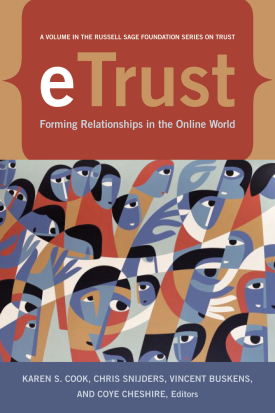
eTrust
About This Book
There is one thing that moves online consumers to click “add to cart,” that allows sellers to accept certain forms of online payment, and that makes online product reviews meaningful: trust. Without trust, online interactions can’t advance. But how is trust among strangers established on the Internet? What role does reputation play in the formation of online trust? In eTrust, editors Karen Cook, Chris Snijders, Vincent Buskens, and Coye Cheshire explore the unmapped territory where trust, reputation, and online relationships intersect, with major implications for online commerce and social networking.
eTrust uses experimental studies and field research to examine how trust in anonymous online exchanges can create or diminish cooperation between people. The first part of the volume looks at how feedback affects online auctions using trust experiments. Gary Bolton and Axel Ockenfels find that the availability of feedback leads to more trust among one-time buyers, while Davide Barrera and Vincent Buskens demonstrate that, in investment transactions, the buyer’s own experience guides decision making about future transactions with sellers. The field studies in Part II of the book examine the degree to which reputation facilitates trust in online exchanges. Andreas Diekmann, Ben Jann, and David Wyder identify a “reputation premium” in mobile phone auctions, which not only drives future transactions between buyers and sellers but also payment modes and starting bids. Chris Snijders and Jeroen Weesie shift focus to the market for online programmers, where tough competition among programmers allows buyers to shop around. The book’s third section reveals how the quality and quantity of available information influences actual marketplace participants. Sonja Utz finds that even when unforeseen accidents hinder transactions—lost packages, computer crashes—the seller is still less likely to overcome repercussions from the negative feedback of dissatisfied buyers.
So much of our lives are becoming enmeshed with the Internet, where ordinary social cues and reputational networks that support trust in the real world simply don’t apply. eTrust breaks new ground by articulating the conditions under which trust can evolve and grow online, providing both theoretical and practical insights for anyone interested in how online relationships influence our decisions.
KAREN S. COOK is Ray Lyman Wilbur Professor of Sociology and the current chair of the sociology department at Stanford University.
CHRIS SNIJDERS is professor at the Eindhoven University of Technology.
VINCENT BUSKENS is associate professor in the Department of Sociology/ICS at Utrecht University.
COYE CHESHIRE is assistant professor at the School of Information at the University of California, Berkeley.
CONTRIBUTORS: Vincent Buskens, Coye Cheshire, Karen S. Cook, Chris Snijders, Judd Antin, Brandy Aven, Davide Barrera, Gary E. Bolton, Andreas Diekmann, Alexandra Gerbasi, Ben Jann, Tapan Khopkar, Azi Lev-On, Masafumi Matsuda, Uwe Matzat, Axel Ockenfels, Paul Resnick, Hiroyuki Takahashi, Yukihiro Usui, Sonja Utz, Jeroen Weesie, David Wyder, Toshio Yamagishi, and Noriaki Yoshikai.
A Volume in the Russell Sage Foundation Series on Trust
Related Events & Media
RSF Journal
View Book Series
Sign Up For Our Mailing List
Apply For Funding
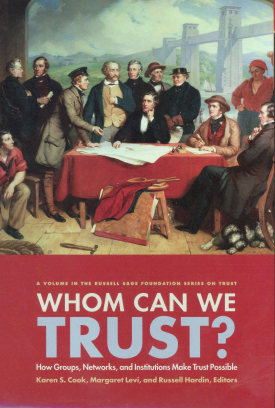
Whom Can We Trust?
About This Book
Conventional wisdom holds that trust is essential for cooperation between individuals and institutions—such as community organizations, banks, and local governments. Not necessarily so, according to editors Karen Cook, Margaret Levi, and Russell Hardin. Cooperation thrives under a variety of circum-stances. Whom Can We Trust? examines the conditions that promote or constrain trust and advances our understanding of how cooperation really works.
From interpersonal and intergroup relations to large-scale organizations, Whom Can We Trust? uses empirical research to show that the need for trust and trustworthiness as prerequisites to cooperation varies widely. Part I addresses the sources of group-based trust. One chapter focuses on the assumption—versus the reality—of trust among coethnics in Uganda. Another examines the effects of social-network position on trust and trustworthiness in urban Ghana and rural Kenya. And a third demonstrates how cooperation evolves in groups where reciprocity is the social norm. Part II asks whether there is a causal relationship between institutions and feelings of trust in individuals. What does—and doesn’t—promote trust between doctors and patients in a managed-care setting? How do poverty and mistrust figure into the relations between inner city residents and their local leaders? Part III reveals how institutions and networks create environments for trust and cooperation. Chapters in this section look at trust as credit-worthiness and the history of borrowing and lending in the Anglo-American commercial world; the influence of the perceived legitimacy of local courts in the Philippines on the trust relations between citizens and the government; and the key role of skepticism, not necessarily trust, in a well-developed democratic society.
Whom Can We Trust? unravels the intertwined functions of trust and cooperation in diverse cultural, economic, and social settings. The book provides a bold new way of thinking about how trust develops, the real limitations of trust, and when trust may not even be necessary for forging cooperation.
KAREN S. COOK is Ray Lyman Wilbur Professor of Sociology and the current chair of the sociology department at Stanford University.
MARGARET LEVI is Jere L. Bacharach Professor of International Studies in the Department of Political Science at the University of Washington, Seattle.
RUSSELL HARDIN is professor of politics at New York University.
CONTRIBUTORS: Abigail Barr, Bruce G. Carruthers, Matthew R. Cleary, Jean Enminger, Henry Farrell, Margaret Foddy, Corina Graif, James Habyarimana, Philip T. Hoffman, Macartan Humphreys, Jeffrey C. Johnson, Roderick Kramer, Stefanie Mullborn, Gabriella R. Montinola, Elinor Ostrom, Daniel N. Posner, Gilles Postel-Vinay, Jean-Laureant Rosenthal, Robert J. Sampson, Irena Stepanikova, Susan C. Stokes, David Thom, James Walker, Jeremy M. Weinstein, Toshio Yamagishi.
A Volume in the Russell Sage Foundation Series on Trust
RSF Journal
View Book Series
Sign Up For Our Mailing List
Apply For Funding
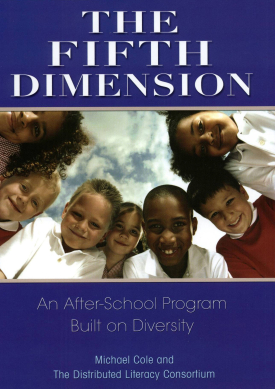
The Fifth Dimension
About This Book
The significant increase in the number of working mothers over the last twenty years has led to widespread worries about the plight of “latchkey kids,” who return from school each day to empty homes. Concerned that unsupervised children might be at greater risk of delinquency, schools and communities across the nation began providing after-school activities. But many of these programs were hastily devised with little understanding of what constitutes a quality program that meets children’s developmental needs. The Fifth Dimension explores and evaluates one of the country’s most successful and innovative after-school programs, providing insightful and practical lessons about what works and doesn’t work after-school.
The Fifth Dimension program was established in the 1980s as a partnership between community centers and local colleges to establish an educational after-school program. With an emphasis on diversity and computer technology, the program incorporates the latest theories about child development and gives college students the opportunity to apply their textbook understanding of child development to real learning environments. The Fifth Dimension explores the design, implementation, and evaluation of this thriving program. The authors attribute the success of the Fifth Dimension to several factors. First, the program offers a balance of intellectually enriching exercises with development enhancing games. Second, by engaging undergraduates as active participants in both learning and social activities, the program gives local community organizations a large infusion of high-quality help for their educational efforts. Third, by rewarding children for their achievements and good behavior with greater flexibility in choosing their own schedules, the Fifth Dimension acts as a powerful, enduring motivator.
The Fifth Dimension program serves as a model for what an enriching after-school program can be. The product of years of innovation and careful assessment, The Fifth Dimension is a valuable resource for all who are interested in developing successful community-based learning programs.
MICHAEL COLE is university professor of communication and psychology at the University of California, San Diego.
RSF Journal
View Book Series
Sign Up For Our Mailing List
Apply For Funding
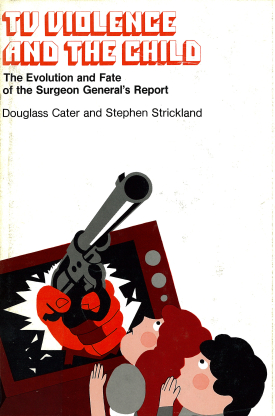
TV Violence and the Child
About This Book
In 1969, Senator John Pastore requested that the Surgeon General appoint a committee to conduct an inquiry into television violence and its effect on children. When the Surgeon General's report was finally released in 1972—after a three-year inquiry and a cost of over $1.8 million—it angered and confused a number of critics, including politicians, the broadcast industry, many of the social scientists who had helped carry out the research, and the public.
While the final consequences of the Report may not be played out for years to come, TV Violence and the Child presents a fascinating study of the Surgeon General's quest and, in effect, the process by which social science is recruited and its findings made relevant to public policy.
In addition to dealing with television as an object of concern, the authors also consider the government's effectiveness when dealing with social objectives and the influence of citizen action on our communication systems. Their overwhelming conclusion is that the nation's institutions are ill-equipped for recruiting expert talent, providing clear findings, and carrying out objectives in this area of delicate human concern.
DOUGLASS CATER is director of the Aspen Institute Program on Communications and Society.
STEPHEN STRICKLAND is director of the Washington, D.C., office of the Health Policy Program of the University of California, San Francisco.
Download
RSF Journal
View Book Series
Sign Up For Our Mailing List
Apply For Funding
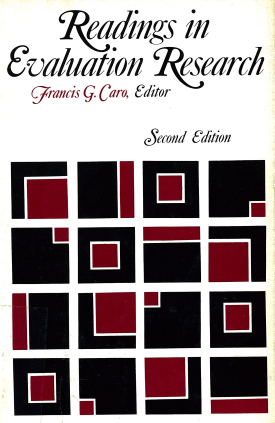
Readings in Evaluation Research, Second Edition
About This Book
Affords a comprehensive overview of evaluative research, answering questions regarding the adequacy of organized programs in health, justice, education, employment, and welfare. Included are general statements about evaluative research, discussing the nature of the evaluative task, the role of evaluative research in programs for change, and appropriate methodological strategies. In this revised and expanded collection of readings, which includes more case materials and more illustrations of completed evaluations than the first edition, the editor presents a variety of viewpoints and a broad range of materials for the social planner, administrator, and social scientist.
FRANCIS G. CARO was director of the Office of Program Planning and Research at the Community Service Society in New York City.
Download
RSF Journal
View Book Series
Sign Up For Our Mailing List
Apply For Funding
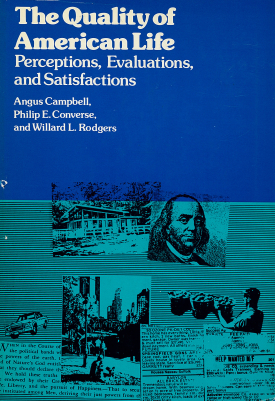
The Quality of American Life
About This Book
Considers how Americans define the quality of their life experiences, as expressed in their perceptions, evaluations, and satisfactions. Based on research conducted by the Institute for Social Research at the University of Michigan, the book uses data which are representative of the national population eighteen years of age and older, and employs the major social characteristics of class, age, education, and income. The authors cover such topics as the residential environment, the experience of work, marriage, and family life, and personal resources and competence. They also report on the situation of women and the quality of the life experience of black people.
ANGUS CAMPBELL is professor of psychology and sociology and director of the Institute for Social Research at the University of Michigan.
PHILIP E. CONVERSE is Robert C. Angell Professor of Political Science and Sociology and program director of the Center for Political Studies at the Institute for Social Research at the University of Michigan.
WILLARD L. RODGERS is senior study director of the Survey Research Center, Institute for Social Research, at the University of Michigan.
Download
RSF Journal
View Book Series
Sign Up For Our Mailing List
Apply For Funding
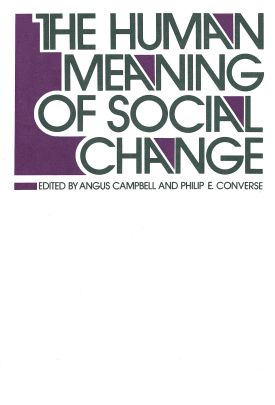
The Human Meaning of Social Change
About This Book
This book is a companion piece to Sheldon and Moore’s Indicators of Social Change. Whereas Indicators of Social Change was concerned with various kinds of “hard” data, typically sociostructural, this book is devoted chiefly to so-called “softer” data of a more social-psychological sort: the attitudes, expectations, aspirations, and values of the American population.
The book deals with the meaning of change from two points of view. First, it is interested in the human meaning which people attribute to the complex social environment in which they find themselves; their understanding of group relations, the political process, and the consumer economy in which they participate. Secondly, it discusses the impact that the various alternatives offered by the environment have on the nature of their lives and the fulfillment of those lives.
The twelve essays which make up the volume deal successively with the major domains of life. Each author sets forth an inclusive statement of the most significant dimensions of psychological change in a specific area of life, to review the state of present information, and to project the measurements needed to improve understanding of these changes in the future.
ANGUS CAMPBELL is professor of psychology and sociology and director of the Institute for Social Research at the University of Michigan.
PHILIP E. CONVERSE is Robert C. Angell Professor of Political Science and Sociology and program director of the Center for Political Studies at the Institute for Social Research at the University of Michigan.
CONTRIBUTORS: Angus Campbell, Philip E. Converse, John P. Robinson, Peter H. Rossi, Marvin B. Sussman, Robert L. Kahn, Rolf Meyersohn, George Katona, Herbert H. Hyman, Albert J. Reiss Jr., and Melvin Seeman.
Download
RSF Journal
View Book Series
Sign Up For Our Mailing List
Apply For Funding
Pagination
- Previous page
- Page 44
- Next page
